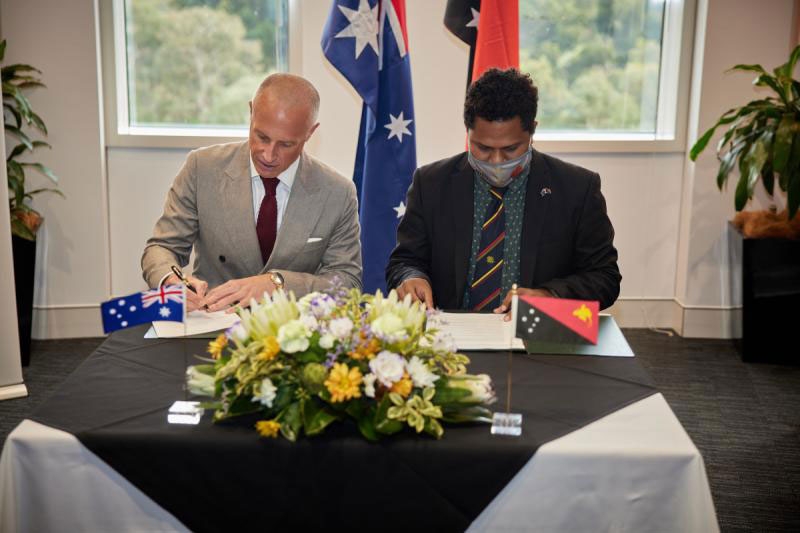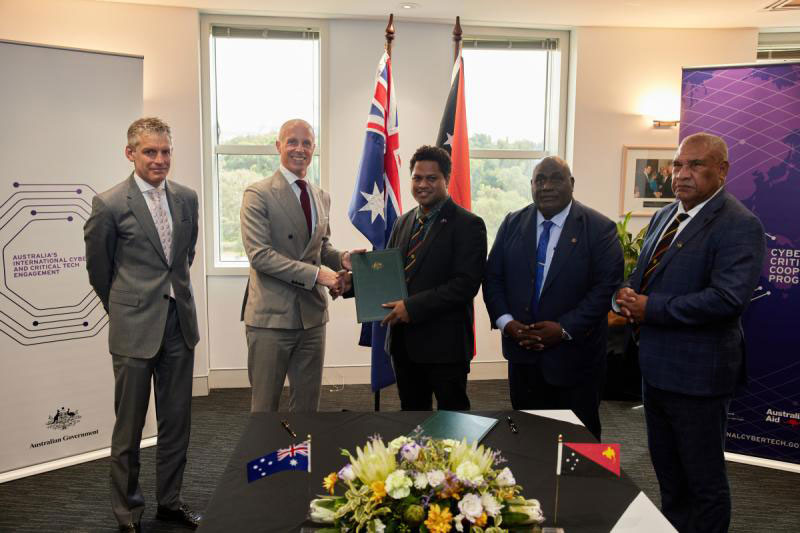Papua New Guinea

On 30 March 2022, Dr. Tobias Feakin, (then) Australian Ambassador for Cyber Affairs and Critical Technology, and Mr Steven Matainaho, Secretary of Papua New Guinea's Department of ICT (DICT), signed a renewed Memorandum of Understanding (MoU) on Cyber Cooperation between Australia and Papua New Guinea (PNG).
The agreement builds on a previous MoU signed in 2018 and paves the way for deepened cooperation to build cyber resilience in support of a safe, secure, and prosperous PNG, Australia, and Indo-Pacific region.
On 2 May 2024, Mr Brendan Dowling, Australian Ambassador for Cyber Affairs and Critical Technology and Mr Steven Matainaho, Secretary of Papua New Guinea’s DICT mutually agreed to amend the renewed MoU to include cooperation on cyber resilience and incident response.
Memorandum of Understanding between the Government of Papua New Guinea and the Government of Australia on Cyber Cooperation
The Government of Papua New Guinea, and the Government of Australia, (hereinafter referred to collectively as "the Participants" and singularly as "the Participant");
Recognising the depth and strength of the economic and strategic relationship between Australia and Papua New Guinea, as outlined under the Comprehensive Strategic and Economic Partnership;
Sharing the vision to enhance our bilateral partnership on cyber affairs, at a time when both countries face significant challenges and opportunities in the international cyber environment;
Desiring to promote an open, secure, stable, accessible and peaceful cyberspace, which drives economic prosperity, protects national security and promotes international stability;
Reaffirming their commitment to promote peace and security in cyberspace based on existing international law, voluntary and non-binding norms of responsible state behaviour, practical confidence building measures, and cooperative capacity building;
Recognising as a result of increasing interconnectivity in the region, information systems and networks are now exposed to a growing number of threats from malicious (government and non-government) cyber actors and vulnerabilities which impact on both prosperity and national security;
Recalling and reaffirming the strong cyber security cooperation that has occurred, most recently, through the 2018 Memorandum of Understanding on Cyber Cooperation between Papua New Guinea and Australia; and
Pursuant to the relevant laws and regulations and international commitments of the Participants;
Have reached the following understandings:
Paragraph 1: Purpose
The purpose of this Memorandum of Understanding (hereinafter referred to as "MoU") is to promote partnerships and provide a framework of cooperation on cyber affairs and digital economy between the Participants.
Paragraph 2: Guiding Principle
The Participants are committed to developing an enhanced economic and security partnership that supports the development objectives of the Government of Papua New Guinea.
Paragraph 3: Areas of Cooperation
Guided by the development objectives of the Government of Papua New Guinea, the Participants have identified the following areas of cooperation for this MoU:
- Coordination and Information Sharing
- Participants will share views, experiences, lessons learned and best practices on cyber affairs and the digital economy.
- Participants will coordinate and consult on cyber-related areas of mutual interest and benefit.
- Capacity Building and Strengthening Connection
- Participants will support improved development and understanding of cyber issues across society, including a focus on the needs of women and girls.
- Participants will support people-to-people connections with a focus on cyber workforce upskilling.
- Capability and Process Development
- Participants will support the development and implementation of systemic governance arrangements related to cyberspace.
- Participants will work together on future cyber-related infrastructure needs and technology.
Paragraph 4: Implementing Arrangements
Institutions of the Participants may arrange between themselves the establishment of implementing arrangements, or other mutually determined written arrangements, under this MoU to operationalise cooperation activities.
The arrangements mutually determined upon by the institutions of the Participants will serve to implement the areas of cooperation.
The establishment, finalisation, and implementation of the arrangements under this MoU will be coordinated and by consent of the respective focal points as stipulated in Paragraph 5 of this MoU.
Paragraph 5: Focal Points
The Participants have identified the following focal points as the lead agencies for the purpose of the implementation of this MoU:
- For Papua New Guinea: Department of Information and Communication Technology (DICT)
- For Australia: Department of Foreign Affairs and Trade (DFAT)
Cooperation will not be limited to these organisations and will be encouraged by all government organisations of the Participants.
Paragraph 6: Entry into Effect, Duration and Termination
This MoU will come into effect on the date of signature by both Participants and will remain in effect for a period of five (5) years, unless terminated by either Participant giving at least one (1) month's written notice prior to the intended date of termination to the other Participant.
Termination of this MoU will not affect the implementation of activities that were decided upon or any on-going activity prior to the date of termination.
This MoU may be extended at any time within the period it remains in effect by the mutual written consent of the Participants. The Participants will convene one (1) year prior to the agreement’s expiration to determine an extension.
Paragraph 7: Amendment
The Participants may propose an amendment to this MoU by submitting it in writing to the other Participant.
An amendment will be effected only upon the mutual written consent of the Participants.
Paragraph 8: Financial Arrangements
The Participants will bear their own costs associated with the activities and participation under this MoU.
Other financial arrangements may be carried out as mutually determined by the Participants.
Paragraph 9: Settlement of Disputes
Any dispute arising out of the interpretation and implementation of this MoU will be settled amicably by the Participants through mutual consultations and negotiations between the Participants.
Disputes will not be referred to any third party, court or international tribunal.
Paragraph 10: Confidentiality
The Participants commit to protect the confidentiality of information, technology, and/or data exchanged between the Participants under this MoU against unauthorized disclosure in accordance with the Participants domestic laws, regulations, policies, and directives. This does not apply where the information is legally accessible to the public.
Information, technology, and/or data exchanged under this MoU shall not be transmitted to a third party without prior written consent of the other Participants.
In the event of the expiration or termination of this MoU, provisions under this Paragraph shall still apply in terms of the confidentiality of this MoU.
Paragraph 11: Legal status of the MoU
This MoU does not create any legally binding obligations, and does not alter or effect any existing agreements between the Participants.
The Participants acknowledge that this MoU is not an international agreement and will not create legal obligations governed by their respective domestic law or international law.
The terms of this MOU operate subject to, and do not supersede respective international obligations and domestic laws, policies and procedures of the participants.


